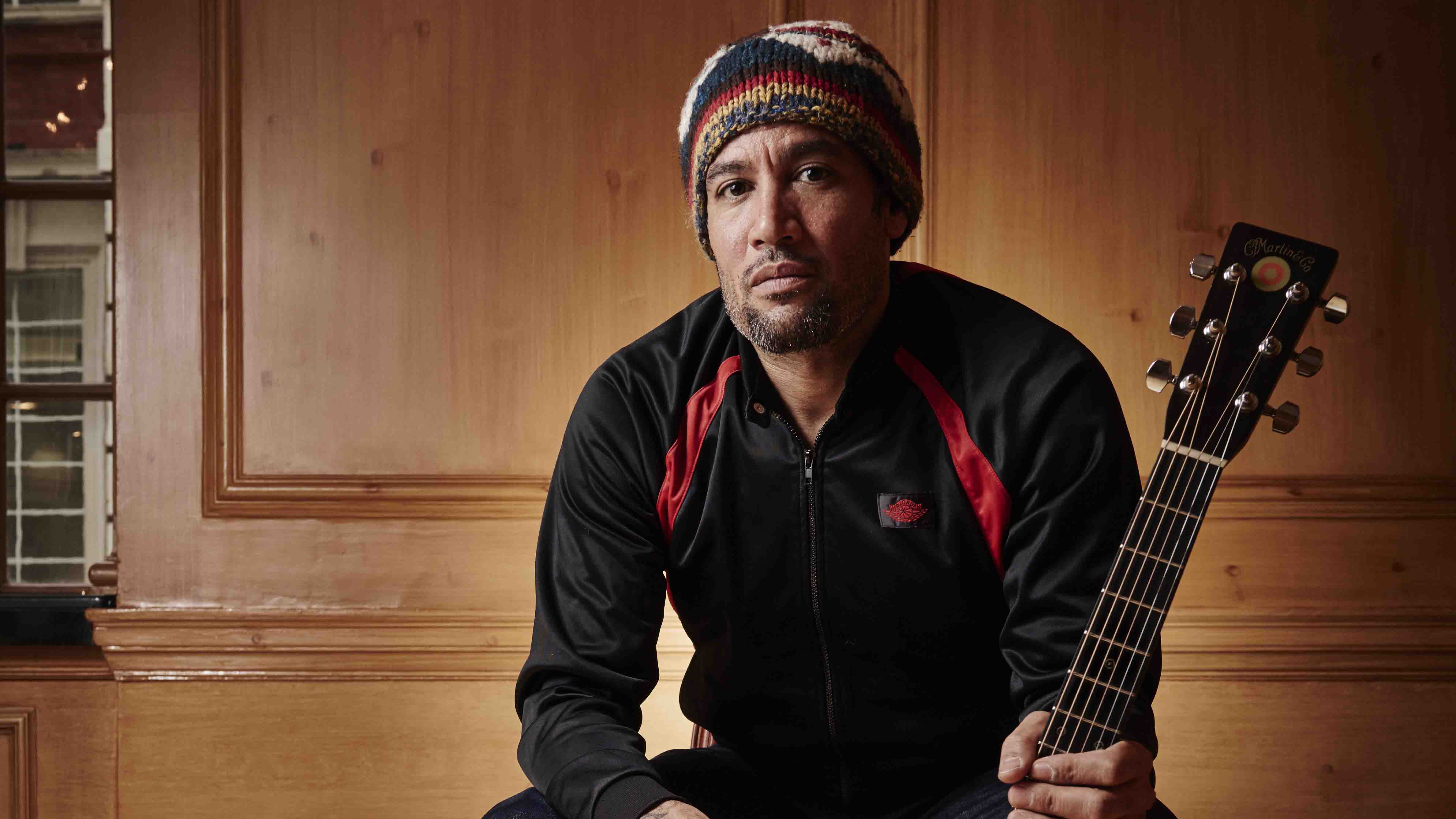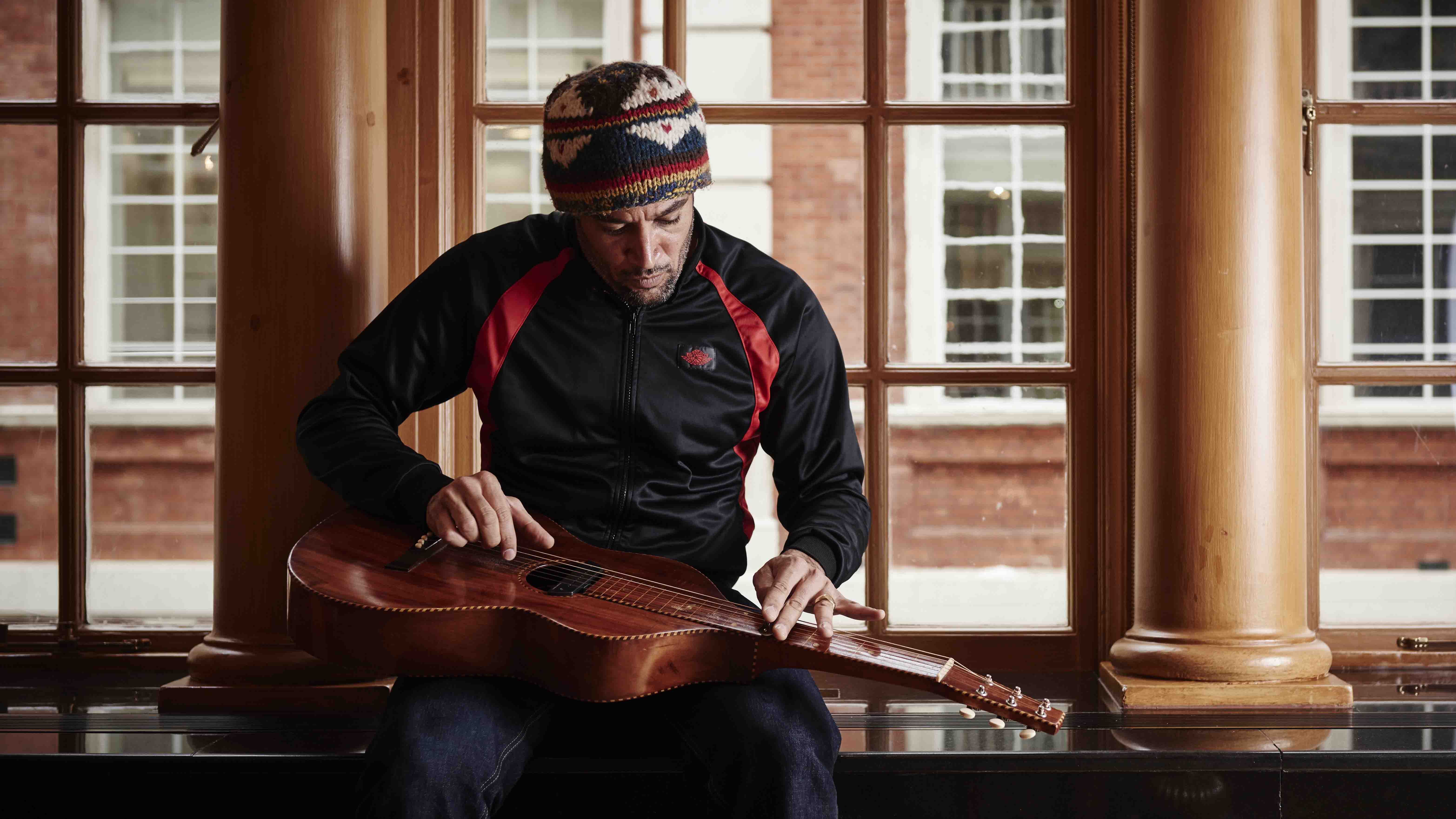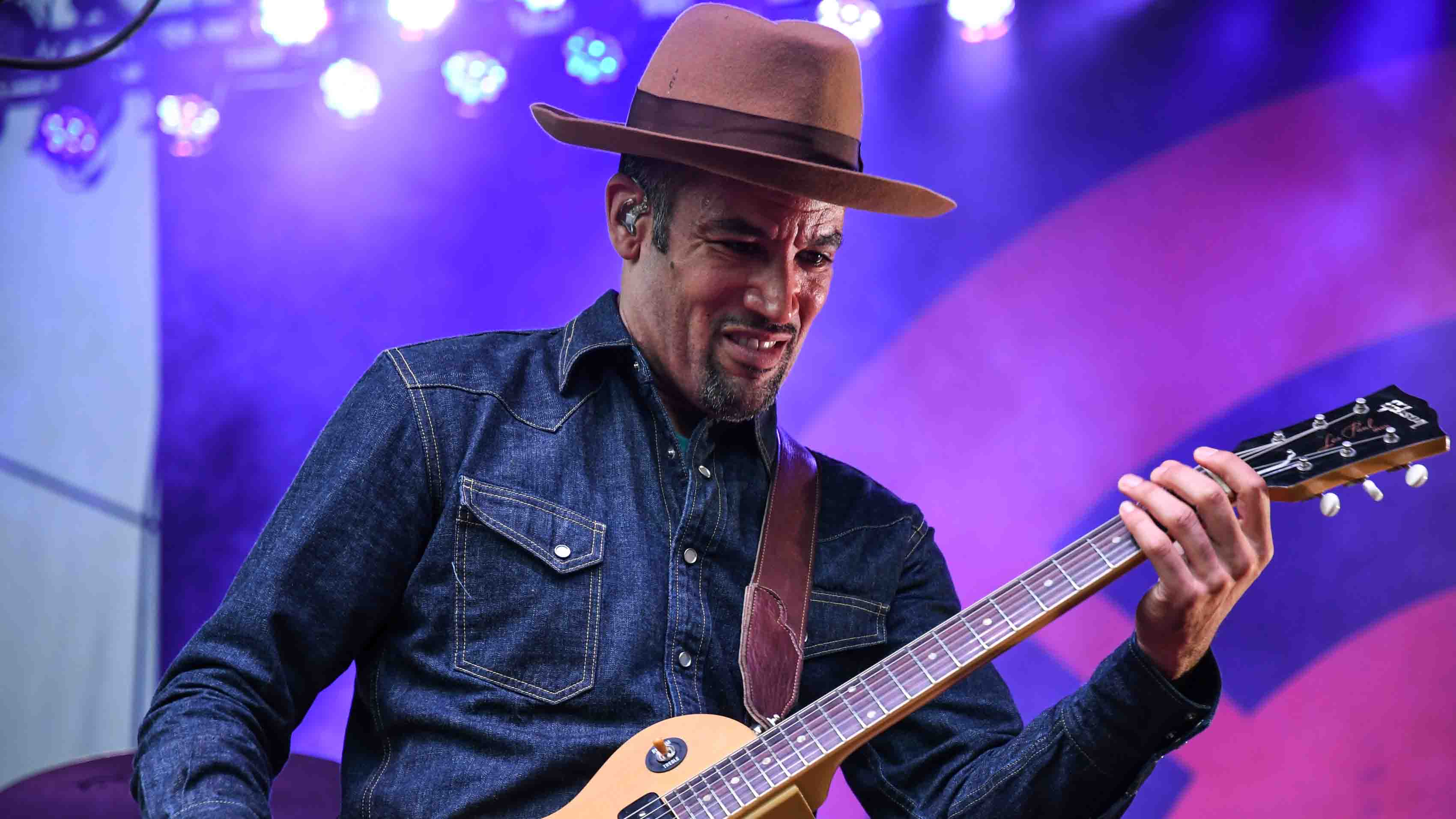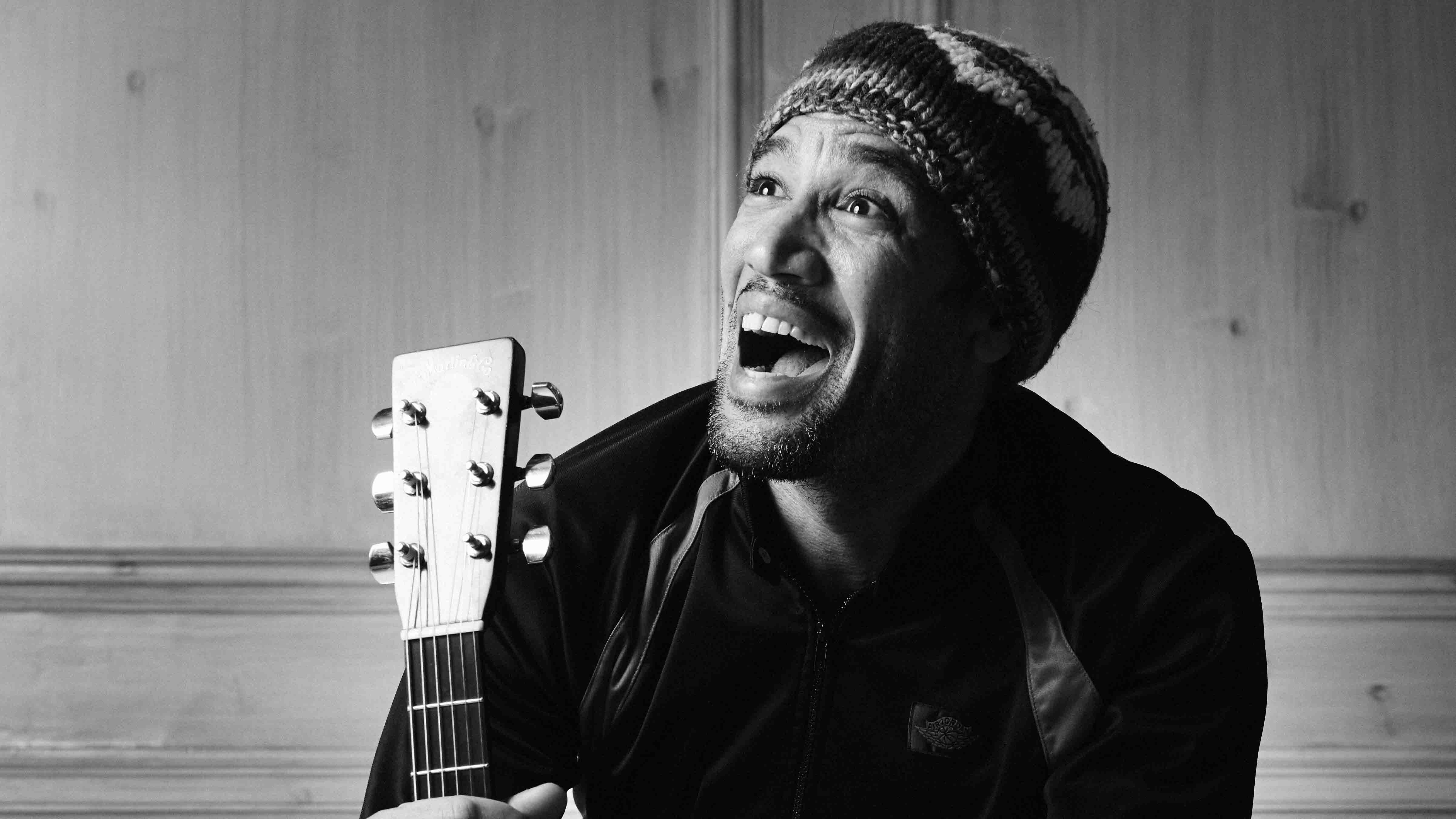Ben Harper's top 10 tips for guitarists and songwriters
Blues slide ace talks The Innocent Criminals and Call It What It Is

Introduction: Call It What It Is
Ben Harper is a soul man. When he picks up his slide, the emotion just pours out of him.
From his 1994 debut right up to recent release, Call It What It Is – his first with co-conspirators The Innocent Criminals in almost a decade – the 46 year-old Californian’s ability to transcend boundaries has made him one of the more uncategorisable mavericks of our age.
Relaxing inside one a swanky London hotel, the multiple Grammy-winner is as mellow as his music – respectfully courteous and humble to all. He pours himself a strong cup of coffee and guides you through the creative process behind some of the greatest slide guitar sounds in recent history…
1. Give music time to breathe
Remove yourself from what you create whenever you can
“One thing that was different this time round was the way we went about recording – instead of the usual month-long submersion, we did one week blocks and then we’d go away for two months, not listening to any of it until we came back. That gave us a clear picture of what was truly going on.
“Because sometimes what you think you’re doing and what you’re actually doing aren’t always the same thing. When you’re younger it doesn’t matter, you’re running through brick walls, but as you get older and the world starts getting in on your creative process, you start to look at that creativity in a different way.
“I needed distance and objectivity to not be inhibited, and to be sure what we were doing was what we thought we were doing.”
Don't Miss

2. Make it your life's work
It takes dedication to master any instrument
“Slide guitar resonated deeper within me than anything else, so it became my life’s work.
“You start at the beginning with Robert Johnson, Blind Willie Johnson, Son House, Bukka White and then work your way through to Lowell George, Ry Cooder, Bonnie Raitt and David Lindley. And the old Hawaiian masters like Sol Ho’opi’i were big influences, too. I was living and breathing that sound.
“The next thing you know, you’ve heard enough slide guitar to know what you want to sound like. And from that point on, it never sounds like your heroes but more your own version of different things.
The quest should be to get better and not peak too soon, or to not peak at all
“I grew up as a music store brat [Ben’s grandparents opened the folk music centre in Claremont, a city about 30 miles east of Los Angeles, back in 1958]. I heard guys come in and play all this great jazz stuff like Joe Pass or Al Di Meola, and other guys who could play Hendrix or Zeppelin note-for-note.
“If I ever went back to school, my master's [degree] thesis would be: Why do certain people gravitate to certain sounds? Why would anyone ever want to play the freakin’ trombone or tuba? Because it’s in their soul, it’s part of their life, they live it. The quest should be to get better and not peak too soon, or to not peak at all.”
3. It’s all in one hand
With slide guitar all your tone, phrasing, vibrato and feel comes from one place
“Make sure you stay steady with your slide hand, don’t be too frantic or nervous. Figure out a chord that resonates with you as an open tuning and just have at it. Take the time to work on your intonation and ear. Slide guitar is all in your left hand, that’s what will make you sound unique!
“It’s funny, when Jack Johnson came out with Brushfire Fairytales, we were already friends. He asked if I would be up for playing on a song. The music was so great, I said, ‘Sure!’ And played on a song called Flake, which was a massive hit.
“Once I was in Guitar Center and someone came up to me saying, ‘Jack Johnson’s ripping you off, man - there’s a slide player on this song that sounds just like you!’ And I had to say, ‘Hey man, that’s me!’ – Which is also a sign that kids aren’t reading the liner notes these days!”

4. Listen to each other
Ben’s countless collaborations are the result of a respectful work ethic
“The Innocent Criminals is a collective, there’s no question there – whether it’s from a writing or a production vantage point with our engineer Ethan Allen. You think that could be too many cooks in the kitchen, but it couldn’t be further from that.
“The reason it works is that certain guys would step up on certain songs; it wasn’t all six of us saying, ‘Bring up the bass! Bring up the drums! Bring up the guitars!’ It wasn’t anything like that. Two or three guys would step up and lead the charge on each track, you could tell who was going to take over knowing what people’s specialties were.
“It was a great dance in that regard, people backing off and giving each other the space to step up. I’ve never imposed my will. I’ve gotten to play with a lot of people through meeting other musicians and getting some surprise phone calls! I hope at the end of my life people will look at my discography as the most eclectic, cross-pollinated collaboration list of all time! [laughs]”
5. Forget about ego
You can learn more about yourself from other musicians
“The more humble you are when approaching whatever session it is, the more you’re going to learn.
“A famous guitarist was doing a session once and when he got there, they were humming what they wanted him to play. And he just said, ‘Hey, listen! Anything I play is going to be so much better than what you’re humming to me… don’t bother!’
It’s an exciting prospect to play with someone else and surprise them as well as yourself
“I loved that, and he was probably right in his case, but there’s also no growth to that. When you play what’s inside someone else’s head… that’s where growth is. If you think you know everything, there’s no room for more. Playing what you feel isn’t really growth, is it? You’re just flexing that creative muscle, but playing something that makes you uncomfortable is where the growth truly is.
“If you’re willing to take a deep breath and a backseat to your own ego and let someone else conduct you, that’s pretty cool. It’s an exciting prospect to play with someone else and surprise them as well as yourself. That’s what tightens the screws.”

6. Never stop experimenting
Different tones can inspire different songs
“Find a decent and affordable reverb pedal and dial it to where it’s not oversaturating the notes and just complimenting them, depending on what you want to hear. Something that simple can inspire all kinds of musical and lyrical directions.
“It can take you down a different road sonically, which will take you down a different road lyrically. Because sonics and lyrics are so inextricably linked – it’s important to explore those roads together.
“Similarly, I had to grow into blending acoustic and electric sounds, and I think finally this new record represents more of that. Look at Led Zeppelin IV – to make an acoustic song drive as hard as an electric, that’s the shit! Or if you take an electric and stick it underneath the acoustic, letting that take the lead. Don’t be afraid to change things around.
Sonics and lyrics are so inextricably linked – it’s important to explore those roads together
“Even a simple reverb can be so inspiring, but my favourite built-in reverb comes from a Fender Princeton. Everything about it is perfect: they are completely functional and you can dial in small amounts. That’s the reverb I love, but everybody’s gotta find the one they want with their own ears.”
7. Find your routine
Learn how to get the best out of yourself
“Before a gig, I systematically eat early, about 3pm right before soundcheck. So by the time it gets to performing, I’ve got the benefit of the nutrition and I’m not up there digesting!
“That’s what a lot of athletes do; I have a lot of friends that are pro skaters and they never eat right before a demo or competition. They time that process very strategically. After that, I act like I don’t have a gig - I just kick around.
“We usually rehearse the first song, because if that goes great, then chances are the gig will go great, too. It’s mainly important to know what you’re going to do in those first few moments.”

8. The possibilities are endless
Opening yourself up will boost your creativity
“Any honest musician will tell you it’s hard not to get sick of the sound of your own voice after so long. When you get comfortable in what you know, what are you going to learn after that?
“If I played one genre, I’d go insane. It wouldn’t be for me, but then for the next guy it might work better to stay in the same lane. That’s always been my stock of trade: musical eclecticism. Being diverse is what has gotten me this far.
If I played one genre, I’d go insane
“In other regards, that may have possibly held me back from being more accessible to a mainstream audience, but that sounds like an excuse for not having a hit! [laughs] As much as I want one, it’s gotta be on my own terms. Anyone that wants a hit needs a good bit of luck, even if the song is great. No matter what, you’ve got to have your ear tuned to something different.”
9. Take inspiration from the world
Write about the things that move you most
“I’ve never been shy of putting pen to paper in the name of whatever perspective I feel is righteous. Not that I’m self-righteous… When I see something moving on the television or read about it in the news, I want to be counted in my own way, personally and creatively.
“I try to get at it through a song. I’m realistic about what a song can do in the name of that, but I’m also not blind to what it can’t do either. One song is not necessarily going to end certain things, but you only have your life to make your statement.
“[Politically charged] pieces like Excuse Me Mr or Call It What It Is have their own way of finding you, writing you as much as you write them. I know that sounds a bit heady - I don’t mean for it to - but sometimes you feel something so strong in the name of love or social activism, you’ve got to ride it all the way.
“You can take a lot of heat for that, too - those kinds of songs stir emotions in a very particular way, I find. But I’ve got the shoulders for it, so bring it!”

10. Good music will endure
The industry has changed but it’s not dead
“One thing that hasn’t changed is people’s scale by which they measure a great song – you still have to bring the goods. You still have to come out with something significant; there’s still a need for good songs. All that’s changed is how they are marketed and consumed - people’s attention spans are different now.
“That definitely needs to be on the agenda of conversation for smart music fans: where are we going?! Because in the 50s, it all started with singles and B-sides – there were no records. Then some crafty firm figured instead of selling one song for a buck, they could sell 10 and get way more… and so the music industry was born.
Singles had their run, then records - it’s time for the new generation to decide where it’s gonna go
“Singles had their run, then records - it’s time for the new generation to decide where it’s gonna go. But what I love is because of how things have shifted, people have become advocates for whatever they prefer. Everyone’s become militant about Spotify or iTunes or vinyl, which is pretty hip, because at least it protects music.
“People place high importance on not only the quality of recording, but the material itself… us musicians really are under the microscope these days!”
Call It What It Is by Ben Harper & The Innocent Criminals is available now on Stax Records.
Don't Miss
Amit has been writing for titles like Total Guitar, MusicRadar and Guitar World for over a decade and counts Richie Kotzen, Guthrie Govan and Jeff Beck among his primary influences. He's interviewed everyone from Ozzy Osbourne and Lemmy to Slash and Jimmy Page, and once even traded solos with a member of Slayer on a track released internationally. As a session guitarist, he's played alongside members of Judas Priest and Uriah Heep in London ensemble Metalworks, as well as handling lead guitars for legends like Glen Matlock (Sex Pistols, The Faces) and Stu Hamm (Steve Vai, Joe Satriani, G3).


